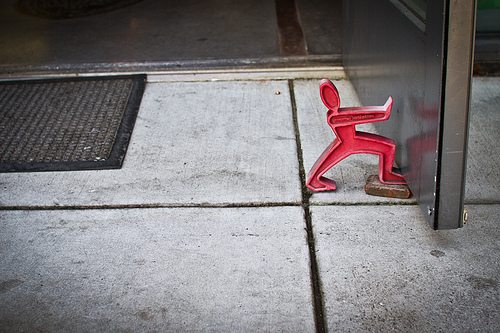Good actions give strength to ourselves and inspire good actions in others. – Plato

"That nice man is holding the door for us" It used to be both a good action and normal behavior. What can you do to inspire good actions in others?
What does that mean?
To me, this quote is about leading by doing. Do good deeds. In doing so, repeatedly, we begin to strengthen ourselves. The strength will be from both the repetition of doing (like building a muscle), and by habituation (it will be your natural course of action).
It also prompts us, in slightly different words, to be a good example. It implies that we should practice doing good actions until they are habituated and part of the core of our being. From that, you will inspire others to do the same. Or, in a very concise form, set an example.
Why is setting an example important?
Well, if you don’t, who are others going to look to for guidance? The wonderful examples of Hollywood (Sheen & Lohen spring to mind) or perhaps the wonderful examples in Washington DC (fill in the names of your least favorite politicians here)?
There are always trend setters, people who help shape the direction the country and even the world goes. Some do it for profit (fashion designers, for example), others for fame (musicians) or glory (pro athletes), still others do it for power (politicians). Others do so quietly and without fanfare (Mother Theresa) and with great humility (Gandhi). Which of the people (or categories of people) listed above would you like to follow the example of? How about your kids?
Your town or city, your country, and even the world will be influenced by someone. You can help select who the people around you follow, imitate and who they, in turn, influence. Please choose wisely.
Where can I apply this in my life?
Even if you don’t really want to step up and offer yourself as an example, you can still do the right thing and inspire the handful of people you know and are present when you do the right thing.
There has been a TV commercial running lately that shows a rough-looking kid grab a purse and take off. He runs down streets and alleys. Then you see a police car. All ends well, because the kid saw a lady get on the bus and leave her purse behind, grabbed it, took a short cut and got it back to her. It’s an interesting commercial, as it is not the ending you expect, given the setup.
How about how you treat others? Do you use the “sharp elbows” to move forward in line, or do you try to wait your turn (and help others wait their turn)? Do you hold doors open for others (at least long enough to allow them to take the door) or do you drop it and let it slam in their face? How many people see that?
How many kids don’t hold doors open for ladies anymore, because a hand full of women influenced our culture in the late 70’s? The course of “chivalry”, if I may be so bold as to use that word, changed. How men treated women has gone down hill, to the point where in some sub-cultures, the treatment is absolutely barbaric. Please don’t think I’m saying one directly caused the other, but influence spreads, and ripples continue long after the stone has sunk to the bottom of the pond.
Another way to be influential, in a subtle manner, is to notice others doing good and give them praise. Sometimes a smile and a nod is all it takes to let them know someone noticed and approved. Even a simple “thankyou” could end up being the difference between a person repeating the behavior or giving up on it.
As humans, we tend to be quick to criticize and slow to praise. Then we complain about all those whine-and-moan types out there, often not realizing how we have helped to create the world they are complaining about (and the nature of the complaining).
If you are a member of a group, what can you do to help reinforce the positive and cut the negative in the group? Are you a member of an organization that helps kids? What can you do to help the kids grow up and become better than average, and in so doing, raise what is considered average?
How about in a store, smiling at others and being kind? Saying nice things to a harried employee of the establishment might help them have a better day, and it might even help them be kinder to the next client (there is the ‘ripples in the pond’ analogy again).
Where else in your life can you be an example of the best humanity has to offer, even if only for a few hours a week? Try it, you might be surprised how effective it is, and how much better you feel about yourself. But be careful, you might like it so much you start doing it all the time. Imagine what an example you could become if that were to occur.
Do good, do it often, be an inspiration to others. That just might be a fulfilling life.
From: Twitter, @TheQuoteToday
confirmed at: http://www.brainyquote.com/quotes/quotes/p/plato384491.html
Photo by randychiu







According to another website this is not actually a quote from Plato. (http://www.quoteyard.com/good-actions-give-strength-to-ourselves-and-inspire-good-actions-in-others/)
That’s very interesting. Thanks for the info.
Many of the quotes attributed to the Ancients come from long out-of-print books with questionable translations. Others are just made up on the spot. I think Abraham Lincoln may have said that, but I’m not sure. 8)
That may be, but this is not the judicial system where something is right until proven wrong, this is philology/philosophy, where something is right after proven right.
So until we find a clear connection to Plato, this quote has to be attributed to Smiles.
Also, if you absolutely need to attribute this set of mind and values to Plato, then by any means, do it! I think it is not impossible, and maybe quite easy to compare the essence of the quote to the philosophy of Plato.
But quotes are not vague references to what the author said. They are quotes. Meaning that when you tell others something that another person has said, then he actually had to say it with 100 percent certainty.
So please change it 🙂 I wrote to BrainyQuotes and told them to fix it there too. And for the future, please check your sources yourself, and don’t use wiki, BQ or whatever else for that. (You can still get a lead on where your source comes from, but never quote these semi-professional sites)
Ah, and by the way, you find a very good source for this quote here: https://archive.org/stream/dutysmiles00smiluoft#page/48/mode/2up
Thanks for the heads-up. Yours was the first I saw of the quote listed as being by someone else (and then, only by showing the paragraph (near the end of the second page) in a their book). I plan to leave it as is, but keep this comment as a second source.